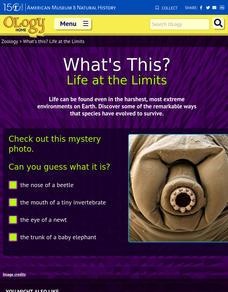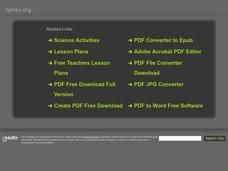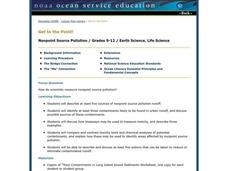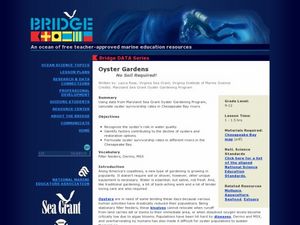NOAA
The Dead Zone
The fifth installment of a 23-part NOAA Enrichment in Marine sciences and Oceanography (NEMO) program defines dead zones and how they form. Pupils then examine data from the Gulf of Mexico to determine dead zone formation.
Curated OER
The Chesapeake Bay in Captain John Smith's Time
When Captain John Smith visited the Chesapeake Bay in the summer of 1608, what types of animals and habitats did he encounter? Your young historians will analyze primary source documents to answer this question, as well as compare the...
Curated OER
Geography Action! Rivers 2001- Human River
Students create a 'human river' by arranging themselves into a river pattern. Each student selects an article to represent a pollutant such as paper, book, or pencil. Students at the source of the river pass their pollutant on to the...
Curated OER
Iona Wastewater Treatment Plant Field Trip
Students go on a field trip to the Iona Wastewater Treatment Plant and learn about sewage, waste, and pollution. In this treatment plant lesson plan, students also complete collection samples of quadrats.
Curated OER
Rock River Watershed
Students discover what a watershed is and which one they live in. Using the internet, they research why watersheds are important to an ecosystem and how to keep them from getting polluted. They use a map to locate various items within a...
Curated OER
Something Fishy Going On
Students create a video animation of how Swimmy gathered his fish friends together to form a great big fish that would frighten the predator tuna away. In art class each child create a small red fish which gets displayed in the ocean...
Curated OER
Sprinkles 5
In this environment worksheet, students read the information and complete the survey about their own local habitats and some of the others in Florida.
Curated OER
To Fish or Not to Fish?
Students demonstrate the decision-making process for marine reserves designations. In this role-playing lesson students analyze maps and data relating to a proposed reserve. They formulate the best decisions based on overall issues.
American Museum of Natural History
What's This? Life at the Limits
There are some amazing ways species evolve to survive. From large ears to sneezing salt, learners read about these interesting adaptations in an interactive lesson. Great to supplement an in-class lesson, it also works well as a remote...
Curated OER
Working With Environmental Issues
Students begin the lesson plan by completing a survey about how much and what types of water they drink on a daily basis. Using a worksheet, they calculate the amount of water an American uses each day and the amount their own family...
Curated OER
Field Trip - Marine Science Institute
Students discover the ocean life of the San Francisco Bay. In this ocean instructional activity, students take a Discovery Voyage of the Bay ecosystem through the Marine Science Institute. Also available are inland voyages, ocean labs,...
Curated OER
Clarity And Turbidity
Students measure the clarity of a body of water and identify possible environmental complications that can be attributed to clarity and turbidity.
Curated OER
Continents and Oceans on the Move
Students create an awareness of the vast percentage of water covering the earth. They relate similarities/differences between topographical maps and other maps of various time periods. Students examine how to use a topographical map.
Curated OER
Turning the Tide on Trash: Marine Debris Curriculum
Six different lessons comprise this unit on marine debris. Science, language arts, social studies, and art projects make this an ideal interdisciplinary unit. The result will be well-informed future citizens who can help make a...
Curated OER
Get to the Point!
Students write out sources of pollution and identify contaminants are most likely found in urban runoff. In this pollution lesson students compare toxicity tests and chemical analysis of potential contaminants.
Curated OER
Amphipods
Students identify organisms that live at the bottom of the body of water. In this biology lesson, students evaluate the effects of pollution to amphipods population. They examine collected data and create a bar graph comparing them.
Curated OER
All That Glitters...
Students study that white light (visible light) is comprised of all colors of the spectrum. They study that the quantity of light decreases with increasing depth in the ocean. They study that the quality of light changes with increasing...
Curated OER
What is the Problem of Boston Harbor?
Students recognize the affects of technology on the environment. They examine data to determine methods to improve waater quality. A research paper is written to desribe recommendations for improving water in the future.
NNF
Floods Happen
Did you know that flooding is the most common natural disaster in the United States? Prepare your learners with the facts about floods and offer them the proper knowledge and tools for dealing with this type of emergency.
KOG Ranger Program
The Value of Oregon’s Forests
No matter where you go, you're in the middle of a forest in some way. Use a lesson about forests and the many ways they contribute to our world, including the ecosystems of animals and plants living in their shady soil.
Curated OER
Oyster Gardens - No Soil Required!
Explore the practice of oyster gardening. Because oysters play a vital role in marine ecosystems and their populations have declined, biologists are transplanting oyster seed to repopulate reefs. After learning about this practice,...
Curated OER
Hos Do the Jaguar and Howler Monkeys in Belize Depend on Us?
First graders access the internet and use the sites provided to research Belize, and in particular, the Howler Monkey and Jaguar. Students participate in activities/centers utilizing the information they discovered.
Curated OER
Living in Hurricane Country
Students examine how hurricanes grow and their strength levels through an interactive program. They define terms associated with hurricanes and how the public is affected by the storms.
Curated OER
The Artemia Hatchery
Students, in groups, develop their hatcheries, working cooperatively in its design and construction. The lessons begin with the introduction to Artemia as a primary food source of many aquaculture species during their larval stages.

























